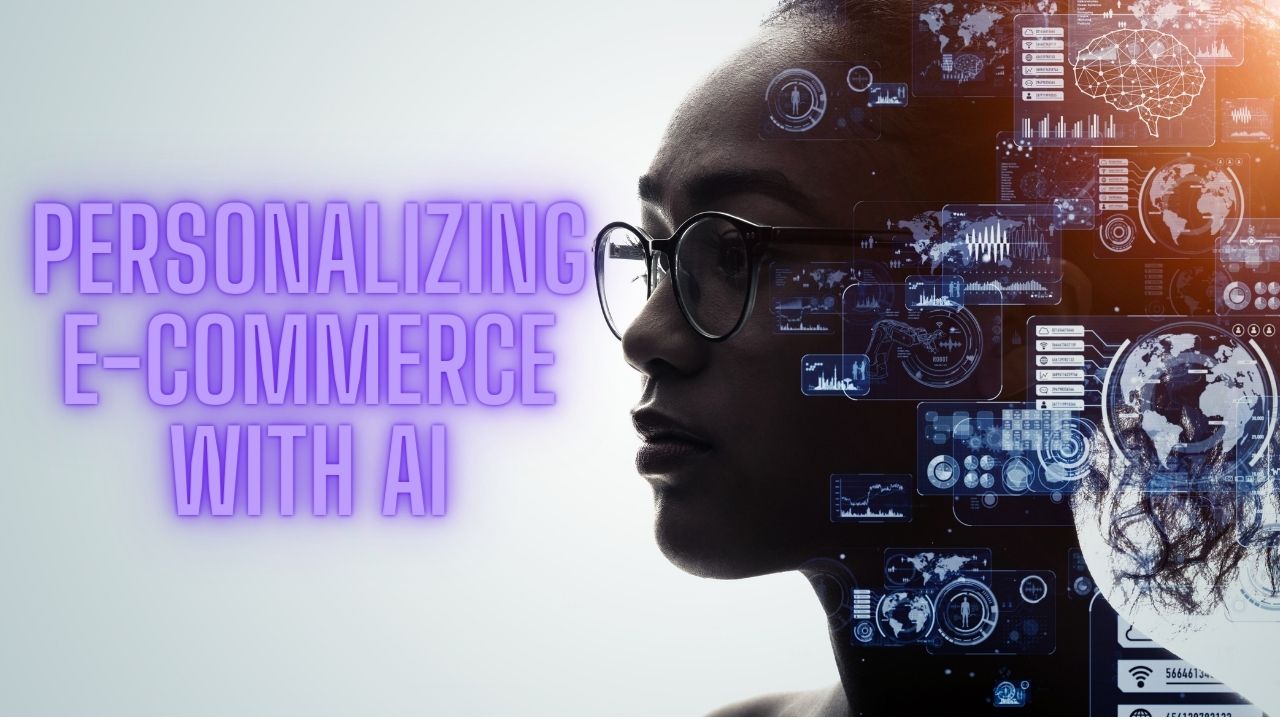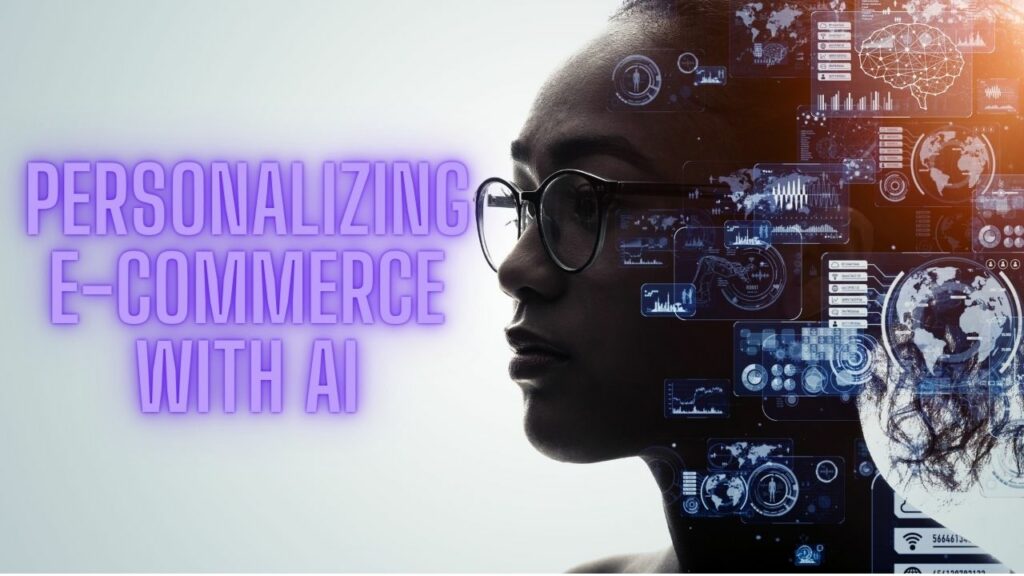 Understanding E-Commerce Personalization
Understanding E-Commerce Personalization
Businesses need to remain competitive in order to afloat, much less successful. One way of continuing its momentum of success is through E-commerce personalization. It is the tailoring of one’s business to meet each customer’s specific requirements. This includes everything, from searches to product descriptions to design layouts. The more tailored the material is, the better the experience will be for the customer overall. This is because it encourages a relationship with each customer, increasing clientele happiness and brand loyalty. One way of achieving this is by personalizing e-commerce with AI tools.
Understanding Artificial Intelligence
The goal of artificial intelligence is to develop intelligent computers that are capable of carrying out tasks that generally require human intellect. This includes pursuing challenges that require perception, thinking, learning, decision-making, and interpreting natural language.
It has the ability to extract the most pertinent data by utilizing other technologies like machine learning, deep learning, and neural networks. Then, with the aid of this information, online merchants may improve their entire client experience.
What is the difference between personalization and customization?
For some, personalization and customization might mean the same thing. However, there are distinct differences between the both of them. Both personalization and customization aim to give customers a distinctive, catered experience. The primary difference between them, however, is that in customization, the customer manages their own experience and preferences. On the other hand, personalization is controlled by the company or website. Personalization heavily concerns predicting certain consumer patterns and providing tools or avenues to accommodate customer inquiries.
The role of AI in personalization
Artificial intelligence is essential to personalization because it enables companies to evaluate massive volumes of customer data and design customized experiences for each user. AI systems can evaluate user behavior and preferences to spot trends and predict what goods or services that might interest them in by utilizing machine learning algorithms.
Here are the concrete ways artificial intelligence enhances the customer’s shopping experience:
1. Personalized product recommendations

Businesses are successful because consumers purchase products from them. However, this simple principle is impacted by the idea of potentially increasing sales from these same customers. This is because returning customers are more inclined to place larger orders than new ones. This is the ideal outcome for most businesses, and it can be made possible and more consistent with personalized product recommendations using AI tools.
AI-based algorithms start working when current consumers access a website and examine their browsing habits, previous purchases, interests, and demographic information. The website then shows users the information that will appeal to them the most based on the data. This raises the likelihood that they will spend more money than they intended.
2. Cross-device personalization

As online shopping becomes more prolific in society, so does technology usage on all kinds of devices. Modern consumers interact with brands via a variety of devices. They can start looking for products on their smartphone and end up placing an order on their laptop, or the other way around. As a result, consumer data is spread out across several devices in silos or fragments.
However, retailers face a challenge in navigating these compartmentalized data sources. It is difficult to manually track these groups of data independently. AI tools Thankfully, multi-channel personalization powered by AI exists. This is possible by creating various client touchpoints like websites, mobile applications, social media, or email marketing. As a result, AI keeps track of how the customer interacts with all of these platforms and builds a single customer profile. Retailers can customize their offerings across various platforms and channels with the aid of this unified consumer view.
3. Conversational commerce

In order to provide individualized buying experiences, conversational commerce makes use of interactions between businesses and customers via messaging and chat apps. Examples of these platforms are Telegram, Facebook Messenger, Instagram, Twitter, and other social media or messaging platforms.
Consumers often prefer to have control over their conversations and receive responses that are human-like. Conversational AI-driven personalization solutions are made to feel human-like for this reason. Users won’t even be able to tell if they are speaking to a live worker or a chatbot.
Conversational AI studies human speech using tools like machine learning (ML) and natural language processing (NLP). The next step is to create individualized responses for users after understanding their intentions. The responses are not constrained by a script and instead come from user dialogues. Consumers benefit from these personalized recommendations and speedy customer service, and more developed tools can allow them to make purchases inside these chat apps.
However, not everybody is fond of push notifications as some are spammy – this is where AI comes in. AI-driven personalization technologies can analyze when customers click on push notifications and deduce what content interests them. This allows brands to segment users in a very personalized way based on their interests.
4. Push notifications

Mobile internet access has increased dramatically in recent years. Almost everyone has access to a smartphone and uses it for various purposes outside of simply using it to message and call others. It is used to also access purchasing platforms and sites. With AI tools available, businesses and companies can capitalize on this shift and use it to their advantage. They can utilize mobile marketing to spread their messages via push notifications.
Push notifications can also be used to promote different kinds of content and update. These include personalized product suggestions, discounts, and invitations to special deals or even pages on social media.
However, some people dislike push notifications because they can cause disturbance to potential customers. Artificial intelligence tools, however, reduce the chances of this happening. AI-driven customization technology can determine what information customers are interested in by analyzing when they click on push notifications. As a result, businesses can segment users in a more tailored manner according to their interests.
5. Targeted marketing

Targeted marketing is a new approach that is made possible with AI tools. As opposed to traditional marketing, which sends advertisements to a large audience, targeted marketing focuses on building a buyer persona from the user’s browsing habits and interests. This buyer persona is then used to make product recommendations based on what the intended audience truly wants.
6. Site search personalization

The final application is through site search personalization. AI-powered personalized search leverages each user’s unique profile to come up with relevant product suggestions. It considers metadata such as one’s purchase history, preferences in product type or style, demographic, browser location, and more.
Benefits of AI in E-Commerce Personalization
It provides important customer data.
Today, artificial intelligence solutions are widely used by all kinds of businesses in different industries. In e-commerce, especially, it is incredibly valuable because of its capacity to gather, evaluate, and derive reliable conclusions from vast amounts of data. After obtaining this data, businesses can use these insights to address customer pain points, produce pertinent content, and eventually comprehend every stage of the buyer experience in order to provide the best customer experience (CX).
It essentially helps retailers understand their customers better. Even with the correct information, it might be challenging to figure out who browses and shops on a business’s website. Online retailers can customize their content for each visitor using artificial intelligence, which employs data science to connect the data points in a way that is simple to understand.
It anticipates customer expectations and behaviors.
The capacity of AI to anticipate a customer’s next moves is one of its most potent features and can be used to produce relevant information like personalized offers, product recommendations, personalized mailings, and more.
Every time a customer visits a website, the artificial intelligence system gathers their data and uses it to suggest pertinent content to engage and persuade them to make a purchase. This is through the use of predictive analysis, wherein it generates conclusions and decisions based on demographic, interests, past purchases, and purchasing behavior, among other aspects.
It offers intelligent product recommendations.
Providing product recommendations is one of the most advantageous features AI has to offer. Multiple studies have proven that customers are more likely to purchase other products after it is recommended to them. This is possible because AI tools are able to analyze information based on their browser history, past purchases, which products they click on, and more.
It improves customer interactions.
A company’s customer service practices have a significant impact on whether or not consumers will return. In addition to addressing customer complaints in real-time, using AI-powered technologies like chatbots and virtual assistants is actually preferred over speaking to their human counterpart.
These automated systems can manage several interactions simultaneously and have a tendency to respond to simple questions fast and efficiently. Most of them are always accessible, making them a practical option for those late-night buyers with inquiries.
It increases conversions and revenue
A business can have the happiest consumers in the world, but if none of them are completing their purchases, it’ll be considered a loss. However, this can be prevented by designing a personalized customer experience. Once this happens, online merchants will be able to engage each of their customers and increase conversions and income more than ever before by utilizing an AI-based customization approach.
E-commerce Personalization: Why It Matters
Online shopping can feel impersonal and daunting, especially when consumers are required to browse hundreds of products. E-commerce personalization can help consumers avoid one of the main obstacles to online shopping: boredom and irritation. Instead of being a tedious process, personalization can lead to enlivening customers and forging a special connection between the company and the consumer. This is important in encouraging positive relationships and sales for productivity on both ends.





